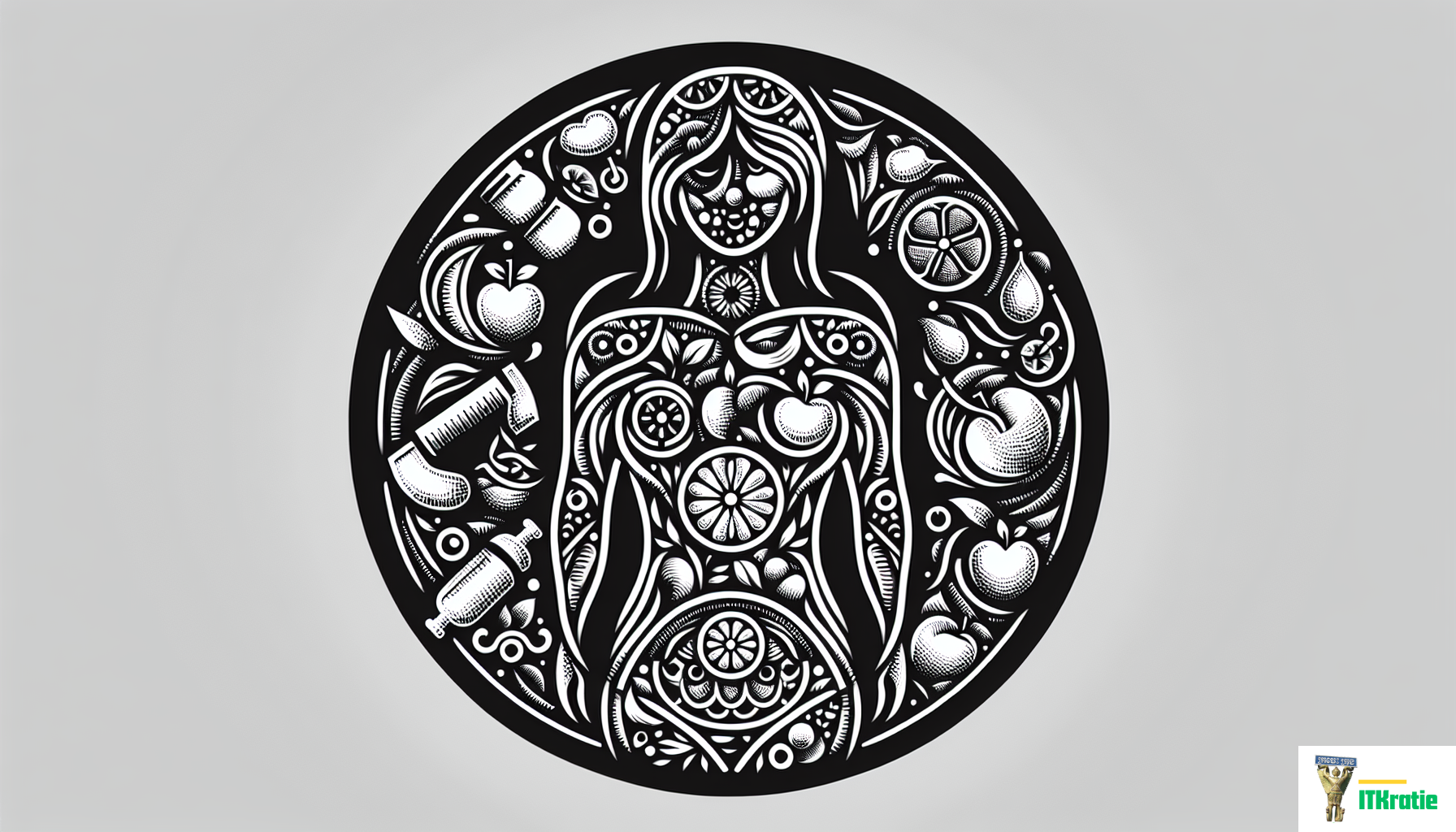Are you looking to improve your overall well-being? Look no further! In this article, we will explore ten healthy girl habits that can help you feel your best. From practicing self-care to fueling your body with nutritious foods, these habits are simple yet powerful ways to prioritize your health. Whether you’re a fitness enthusiast or just starting your wellness journey, incorporating these habits into your daily routine can make a noticeable difference in your physical and mental well-being. So, let’s embark on a journey towards a healthier and happier you!

H2 Heading 1: Physical Health
Maintaining good physical health is crucial for overall well-being. By incorporating regular exercise, proper nutrition, and staying sufficiently hydrated, you can enhance your physical health and feel your best.
H3 Subheading 1: Regular Exercise
Making regular exercise a part of your lifestyle is essential. Engaging in physical activity helps to strengthen your muscles, improve your cardiovascular health, and boost your energy levels. Find activities that you enjoy, whether it’s going for a jog, practicing yoga, or joining a dance class. Aim for at least 150 minutes of moderate-intensity aerobic exercise per week, along with strength training exercises twice a week.
H3 Subheading 2: Proper Nutrition
Proper nutrition is the foundation of good health. Focus on consuming a well-balanced diet that includes a variety of fruits, vegetables, whole grains, lean proteins, and healthy fats. Limit your intake of processed foods, sugary drinks, and excessive amounts of salt. Remember to listen to your body’s hunger and fullness cues and practice mindful eating.
H3 Subheading 3: Sufficient Hydration
Staying sufficiently hydrated is essential for your body to function optimally. Aim to drink at least eight glasses (64 ounces) of water per day. Water helps to regulate body temperature, transport nutrients, and flush out toxins. Carry a reusable water bottle with you wherever you go to ensure you’re staying hydrated throughout the day. Limit your intake of sugary drinks and caffeine, as they can cause dehydration.
H2 Heading 2: Emotional Well-being
Taking care of your emotional well-being is just as important as taking care of your physical health. By practicing self-care, managing stress, and maintaining positive self-talk, you can enhance your emotional well-being and cultivate a positive mindset.
H3 Subheading 1: Self-Care Practices
Self-care practices are essential for nurturing your emotional well-being. Set aside time each day to engage in activities that bring you joy and relaxation. This could include taking a warm bath, practicing meditation or mindfulness, reading a book, or indulging in your favorite hobby. Remember to prioritize self-care and make it a consistent part of your routine.
H3 Subheading 2: Stress Management
Stress is a normal part of life, but chronic stress can have detrimental effects on your emotional and physical health. Find healthy ways to manage and cope with stress, such as deep breathing exercises, practicing yoga or meditation, journaling, or talking to a trusted friend or therapist. Regular exercise and getting enough sleep can also help to reduce stress levels.
H3 Subheading 3: Positive Self-Talk
Your inner dialogue can greatly impact your emotional well-being. Practice positive self-talk by replacing negative thoughts with affirming and encouraging statements. Be kind and compassionate towards yourself, and challenge any self-limiting beliefs. Surround yourself with positive influences and seek support from loved ones to foster a positive mindset.
H2 Heading 3: Mental Stimulation
Keeping your mind active and engaged is vital for maintaining cognitive health and preventing cognitive decline. By reading, continuing to learn, and engaging in hobbies and creative activities, you can stimulate your brain and enhance your mental well-being.
H3 Subheading 1: Reading
Reading is an excellent way to stimulate your mind and expand your knowledge. Make a habit of reading regularly, whether it’s fiction, non-fiction, or even online articles. Reading can improve your vocabulary, enhance your critical thinking skills, and provide a mental escape from daily stressors.
H3 Subheading 2: Continued Learning
Never stop learning! Engage in continued learning opportunities that interest you, such as taking online courses, attending workshops or seminars, or joining a book club. Learning new skills and acquiring knowledge keeps your brain active and promotes cognitive health.
H3 Subheading 3: Engaging in Hobbies and Creative Activities
Engaging in hobbies and creative activities not only provides a sense of enjoyment but also stimulates your brain. Whether it’s painting, playing an instrument, gardening, or cooking, find activities that spark your interest and allow you to express your creativity. These activities can enhance problem-solving skills, boost mood, and provide a much-needed outlet for self-expression.
H2 Heading 4: Quality Sleep
Getting enough quality sleep is essential for your physical and mental well-being. By establishing a bedtime routine, creating a comfortable sleep environment, and avoiding screens before bed, you can improve the quality of your sleep and wake up feeling refreshed.
H3 Subheading 1: Establishing a Bedtime Routine
Establishing a consistent bedtime routine can help signal your body that it’s time to wind down and prepare for sleep. Create a calming routine that includes activities like reading, taking a warm bath, or practicing relaxation techniques. Aim to go to bed and wake up at the same time each day to regulate your sleep-wake cycle.
H3 Subheading 2: Creating a Comfortable Sleep Environment
Create a sleep-friendly environment that promotes relaxation and comfort. Keep your bedroom cool, dark, and quiet. Use comfortable bedding and invest in a quality mattress and pillows that support your body. Consider using blackout curtains, earplugs, or a white noise machine if necessary to block out any disruptive noises or light.
H3 Subheading 3: Avoiding Screens Before Bed
The blue light emitted by screens can interfere with your sleep quality. Avoid using electronic devices such as smartphones, tablets, or laptops at least an hour before bed. Instead, engage in relaxing activities like reading a book, listening to calming music, or practicing gentle stretches or yoga poses.

H2 Heading 5: Regular Health Check-ups
Regular health check-ups are crucial for detecting any underlying health issues and maintaining your overall well-being. By visiting your doctor, scheduling dental and vision check-ups, and staying up-to-date with vaccinations, you can stay on top of your health.
H3 Subheading 1: Visiting the Doctor
Make it a priority to schedule regular check-ups with your doctor. These visits allow for preventive screenings and early detection of any potential health concerns. Discuss any symptoms or concerns you may have, and follow any recommended screenings or tests based on your age and risk factors.
H3 Subheading 2: Dental and Vision Check-ups
Don’t forget about your dental and vision health. Schedule regular check-ups with your dentist for cleanings and exams to maintain oral hygiene and identify any potential dental issues. Similarly, visit an optometrist regularly to ensure you have the correct prescription for your eyes and to detect any vision problems early on.
H3 Subheading 3: Staying Up-to-date with Vaccinations
Vaccinations play a crucial role in preventing infectious diseases. Stay up-to-date with vaccinations recommended for your age group, including annual flu shots, tetanus boosters, and any other vaccines recommended by your healthcare provider. Regular vaccinations protect not only your own health but also the health of those around you.
H2 Heading 6: Skin Care
Caring for your skin is essential for maintaining its health and promoting a youthful appearance. By practicing proper cleansing and moisturizing, using sun protection, and avoiding harmful beauty products, you can achieve healthy and radiant skin.
H3 Subheading 1: Cleansing and Moisturizing
Cleanse your skin regularly to remove dirt, oil, and impurities that can clog your pores. Use a gentle cleanser suitable for your skin type, and avoid harsh scrubbing or overwashing, as this can strip your skin of its natural oils. After cleansing, moisturize your skin to keep it hydrated and prevent dryness. Choose a moisturizer formulated for your skin type and consider using products with natural ingredients.
H3 Subheading 2: Sun Protection
Protecting your skin from the sun’s harmful UV rays is vital for preventing skin damage and reducing the risk of skin cancer. Apply a broad-spectrum sunscreen with an SPF of 30 or higher every day, even on cloudy days. Reapply sunscreen every two hours, especially if you’re spending time outdoors. Wear protective clothing, such as wide-brimmed hats and sunglasses, and seek shade during peak sun hours.
H3 Subheading 3: Avoiding Harmful Beauty Products
Be mindful of the beauty products you use on your skin. Read ingredient labels and avoid products that contain harsh chemicals or potential allergens. Opt for natural or organic skincare products whenever possible. Avoid overuse of cosmetics and allow your skin to breathe regularly. Remember, your skin absorbs what you apply to it, so choose products that are gentle and nourishing.
H2 Heading 7: Social Connections
Building and maintaining social connections is essential for your mental and emotional well-being. By actively engaging in relationships, participating in group activities, and joining clubs or organizations, you can cultivate a supportive social network and enhance your overall happiness.
H3 Subheading 1: Building and Maintaining Relationships
Nurture your existing relationships and actively seek out new connections. Spend quality time with loved ones, whether it’s through regular meetups, phone calls, or virtual hangouts. Show genuine interest in others, be a good listener, and offer support when needed. Building strong relationships provides a sense of belonging, support, and fulfillment.
H3 Subheading 2: Participating in Group Activities
Participating in group activities helps you meet like-minded individuals and encourages bonding over shared interests. Join a fitness class, take up a team sport, or sign up for a workshop or hobby group. Engaging in group activities promotes social interaction, boosts self-confidence, and provides opportunities for personal growth.
H3 Subheading 3: Joining Clubs or Organizations
Consider joining clubs or organizations that align with your interests or passions. Whether it’s a book club, a volunteer organization, or a professional association, becoming a part of these groups allows you to connect with individuals who share similar values and goals. It provides opportunities to network, learn, and contribute to something greater than yourself.
H2 Heading 8: Financial Responsibility
Being financially responsible ensures your financial stability and allows you to plan for the future. By budgeting, being conscious of your spending habits, and investing for the future, you can achieve financial well-being.
H3 Subheading 1: Budgeting and Saving
Create a budget that outlines your income and expenses. Track your spending habits and identify areas where you can cut back. Allocate a portion of your income towards savings or an emergency fund. Set financial goals, such as saving for a down payment on a house or planning for retirement, and regularly review and adjust your budget as needed.
H3 Subheading 2: Being Conscious of Spending Habits
Be mindful of your spending habits and avoid impulsive purchases. Differentiate between needs and wants, and prioritize your financial goals. Before making a purchase, consider if it aligns with your values and if it is a necessary expense. Comparison shop and look for deals or discounts to make the most of your money.
H3 Subheading 3: Investing for the Future
Take steps to invest for your future financial security. Consider consulting with a financial advisor to explore investment options that align with your goals and risk tolerance. Whether it’s investing in stocks, real estate, or a retirement account, investing early and consistently can help build wealth and secure your financial future.
H2 Heading 9: Regular Hygiene Practices
Maintaining regular hygiene practices is essential for personal cleanliness and overall health. By incorporating a daily shower or bath, practicing proper oral hygiene, and maintaining cleanliness, you can promote good hygiene habits.
H3 Subheading 1: Daily Shower or Bath
Make it a priority to shower or take a bath daily to keep your body clean and refreshed. Use a gentle cleanser suitable for your skin type and ensure thorough cleansing of all body parts. Pay attention to areas like the underarms, feet, and groin to prevent body odor and infections. Dry your body thoroughly after bathing to avoid skin irritation and moisture-related issues.
H3 Subheading 2: Oral Hygiene
Proper oral hygiene is crucial for maintaining healthy teeth and gums. Brush your teeth at least twice a day, using a soft-bristled toothbrush and fluoride toothpaste. Don’t forget to clean your tongue and floss daily to remove plaque and food debris between your teeth. Regularly visit your dentist for check-ups and professional cleanings to keep your oral health in check.
H3 Subheading 3: Maintaining Cleanliness
Incorporate cleanliness into your daily routine to prevent the spread of germs and maintain personal hygiene. Wash your hands thoroughly with soap and water before meals, after using the restroom, and after being in public spaces. Keep your living spaces clean and tidy by regularly dusting, vacuuming, and disinfecting commonly used surfaces. Practice good personal hygiene practices, such as washing your hair regularly, trimming your nails, and wearing clean clothes.
H2 Heading 10: Environmental Consciousness
Being environmentally conscious is not only beneficial for the planet but also for your own well-being. By reducing, reusing, and recycling, conserving energy, and supporting sustainable brands, you can contribute to a healthier planet.
H3 Subheading 1: Reduce, Reuse, Recycle
Adopt the mantra of “reduce, reuse, recycle” in your daily life. Minimize waste by opting for reusable products instead of single-use items. Limit your consumption of disposable items like plastic bags, straws, and water bottles. Practice proper recycling by separating recyclable materials from regular waste. Look for opportunities to repurpose or donate items instead of throwing them away.
H3 Subheading 2: Conserving Energy
Conserve energy by making small adjustments to your habits and routines. Turn off lights and electronic devices when not in use, unplug chargers, and adjust your thermostat to energy-efficient settings. Choose energy-saving appliances and light bulbs. Consider using renewable energy sources, such as solar panels, if feasible.
H3 Subheading 3: Supporting Sustainable Brands
Make informed choices by supporting brands that prioritize sustainability and environmental responsibility. Look for brands and products that use eco-friendly materials, practice ethical manufacturing processes, and contribute to environmental causes. By aligning your purchasing power with environmentally conscious companies, you can encourage more sustainable practices and contribute to a healthier planet.
By adopting these healthy habits, you can prioritize and enhance various aspects of your well-being. Remember, taking care of yourself is an ongoing process, so be patient and kind to yourself as you incorporate these habits into your daily life. Here’s to a healthy and fulfilling journey towards becoming the best version of yourself!
